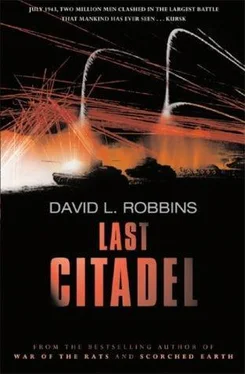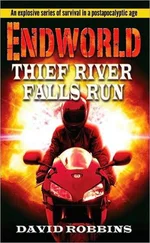‘Witch.’
‘Yes.’
‘Up front. Josef, you too.’
Katya nudged Anna to the front, beside Plokhoi. Josef rode up from the edges of the group.
Plokhoi pointed to Stepnoe village with his nose.
‘You two reconnoiter. You’re father and daughter, if anyone asks. If there’s trouble, head west. We’ll wait here thirty minutes.’ Josef wheeled his mount away and trotted off to the village. Katya nodded to Plokhoi. The colonel returned the gesture. She spun Anna to follow.
Josef rode well. He knew his way around a horse. Katya told him so. The man made no answer.
‘If we’re going to be father and daughter, we ought to talk, don’t you think?’
‘Plokhoi said if anyone asks.’ Josef did not turn his head. ‘No one has asked.’
‘Why are you mad at me? What did I do?’
‘You chased off the pilot.’
‘Lumanov.’
‘If that’s his name.’
Katya wanted to defend herself; she hadn’t chased Leonid off! She’d come to rescue him, just like Josef had. Things went wrong, it wasn’t…
Josef swung his weathered face to her. ‘The partisans is no place for pretty girls on a lark. Do your job, Witch. Stay out of my way.’
Pretty girls? Did this dirty farmer know anything about the Night Bombers, their battle, their rickety planes puttering over enemy targets in every kind of weather, facing night fighters and spotlights and flak, the plummeting deaths in flames? She could ride circles around this old mule Josef and scream at him for all the Witches he’d just insulted. But Leonid had told her, sacrifice is courage. She clamped her teeth. She would sacrifice her anger right now and be silent, there was a mission to do in the approaching village. She had a job, as Josef had snarled at her. She’d do it. And like the pretty Night Witches had shown the male pilots, in every theater they’d flown, about courage and sacrifice, she’d show these partisans here on the ground.
They entered the village. It was arranged around a central dirt street, lined with three dozen small houses. Every house had a tiny garden plot behind it, fenced in with chicken wire and moldering boards. Even in the wan light, Katya could tell the single-story shacks were done up in pastel colors, their porches and cornices decked with gingerbread flourishes. These were steppe peasants, folk who lived their entire lives in three-room homes, toiling in the rich fields where ancestors had done the same and now watched from graves nearby. These were the farm districts collectivized by Stalin in the decade before the war. The people in these houses were starved and threatened, brutalized by their leader, until they accepted his methods. They gave up their lands to the State, and worked in their private gardens only when their long days in Stalin’s fields were done.
Katya and Josef rode down the middle of the road. Other horses tied to posts or in stables whinnied at their arrival, but the partisan horses – like Josef – were determined to remain quiet and surly. Wagons leaned on empty traces in the street; there were no machines, no tractors or cars. All these would have been requisitioned by one army or another long ago.
Katya noted curtains eased back in several windows, lit eyes watched them wandering the village. No one greeted them, no one was even outside the houses. In the far distance, over the northern horizon, the booms of the battle coated the clopping of their hooves.
The Germans had been here, that was clear in the earth. Tracked vehicles had left gouges on the lone dirt road, and in the fields, crops were crushed. But no sign of the occupiers showed in Stepnoe tonight.
‘I’ll go get Plokhoi,’ Josef growled at Katya. ‘You wait here.’
With that he pivoted his horse into the dark and galloped. Katya eased forward in the saddle, stopped. A door opened in a nearby house. An old woman stepped out from a yellow interior. She came right up to Anna and stroked the horse’s brow with fingers like dried twigs.
‘You are with the partisans,’ the woman said.
‘Yes, mother.’
‘Please leave us alone.’ She said this to the horse, as though she knew beseeching Katya to be useless.
‘It’s not my decision.’
‘We have only a few men here. They are old, too, but we need them to work the fields. If they don’t we will starve.’
The woman did not lift her face to Katya. This was the way of the Russian peasant, beaten and badly used by Tsar and Soviet alike. The war had brutalized this little worthless village as profoundly as it stalked the battlefields twenty miles to the north. These people were killed, too.
Katya carried some dried meat and crackers in her pockets. ‘Are you hungry?’
At this the old mamushka lifted her head. ‘No,’ she said. ‘But I think I shall be tomorrow.’
Other doors opened. Villagers edged into the street, the little houses contained a surprising number of people, perhaps a hundred, two-thirds of them were women. The men wore cloth caps and dark jackets, even on a warm summer night, the women came in white blowzy dresses and decorative aprons. There were no bare pates, all heads were under hats and scarves, these peasants covered themselves to go outside, even in front of their own homes to beg a stranger. Every face was wrinkled, every eye a sad witness.
They clustered around Katya. Anna held still. Katya, high in her saddle, felt like another plague sent down among these people, come to skim away the last of their vitality. She looked the gathering crowd over and knew right off which ones Plokhoi would take, that one and that one, those two look like brothers, yes, and there; there might be twenty or more who looked strong enough to mount the final few horses left to this village and ride off with the partisans to fight. And what would be left? She looked down at the first old woman to come outside, the bold one, still caressing Anna’s soft muzzle.
The village people said no more to Katya than ‘Please,’ and ‘We can’t.’ She had nothing to say in response. She sat in their midst for the minutes until Plokhoi rode into the street. In ones and twos they worked their way to her boots in the stirrups, some stroked her leg, others the horse. None looked up at her. Anna heard the pounding of the many coming hooves before the old folks. She stamped a foot once and the people stepped back.
Plokhoi and his partisans rode into town looking like a band of brigands. They advanced tightly packed, their dark horses rubbing shoulders, the riders grimy and slouched in the saddles. There was little military bearing to them, even though many of the men had been soldiers before they joined Colonel Bad and his cell. The villagers edged back to the side of their dirt road.
The mounted cadre stopped. Katya and Anna stood between the two crowds. She backed her horse out of the way.
Plokhoi’s mount strode forward. He spoke, a black voice on this pallid night.
‘Where is your starosta?’
A snowy-bearded old man stepped forward. This was the village elder. Even he was straight-backed and strong; the times in this land were harsh and they formed hard men to live in them.
‘Here, sir.’ The peasant took off his hat and would not look up at Plokhoi.
‘You know who we are?’
‘Yes, sir.’
‘Good. You will send ten of your able-bodied men to come with us.’
The elder’s hands worked his hat in a circle, turning it by the rim. ‘Please, sir. Please.’
Plokhoi’s horse shifted under him, an impatient movement from the animal. His voice matched the horse’s gesture.
‘Please what?’
‘Sir. I am sorry. This we cannot do.’
Plokhoi’s horse moved out of the pack of dark partisans. The animal came close to the starosta and tossed his head. The old man made no move to back away, but the turning of his hat quickened.
Читать дальше












